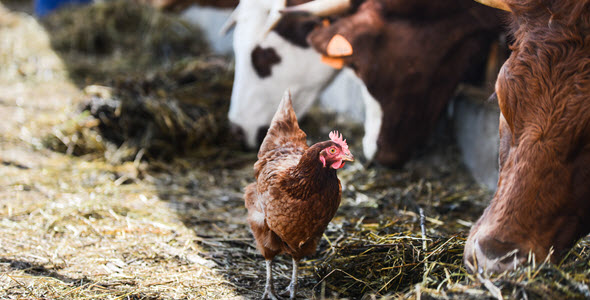By the bioMérieux Connection Editors
As the global demand for meat and poultry has grown, so has the use of antibiotics and antimicrobials in the food-production industry. Routine use of antimicrobials as growth promoters for livestock has been associated with antimicrobial resistance (AMR). Often, antimicrobials are given to animals through their feed, which causes resistant organisms to grow in their digestive tracts. These resistant organisms can contaminate the meat and other animal products during production, as well as the environment through manure.
Using antimicrobials in food production has been linked to drug-resistant infections in both animals and humans. “The rise of AMR in zoonotic pathogens, including last-resort drugs such as colistin, is an important challenge for human medicine because it can lead to untreatable infections,” state the authors of the a 2017 Science article on reducing antimicrobial use in food animals.
The authors of a 2012 public health report agree, noting that, “antibiotic-resistant bacteria of animal origin have been observed in the environment surrounding livestock farming operations, on meat products available for purchase in retail food stores, and as the cause of clinical infections and subclinical colonization in humans.”
The effects of antibiotic use in animals can result from direct and indirect contact. Direct effects can be causally linked to contact with or consumption of antibiotic-resistant bacteria from food animals. Indirect effects can result from humans encountering resistant organisms that have been spread throughout the local ecosystem through manure or contaminated water.
Since 2017, medically important drugs that are important to human health have been disallowed for growth promotion and/or feed efficiency in the U.S. To further address antimicrobial stewardship in veterinary settings, the FDA Center for Veterinary Medicine unveiled a five-year action plan in September 2018, outline the following key initiatives:
(1) Align antimicrobial drug products with the principles of antimicrobial stewardship in veterinary settings
(2) Support efforts to foster stewardship of antimicrobials in veterinary settings
(3) Assess the impact of strategies intended to curb the emergence of antimicrobial resistance associated with the use of antimicrobial drugs in veterinary settings
The overarching goal of these initiatives is to promote animal health while extending the useful life of medically important antimicrobials. In their efforts, the FDA also acknowledges that AMR is a global issue and emphasizes the need for engagement internationally.
Opinions expressed in this article are not necessarily those of bioMérieux, Inc.



